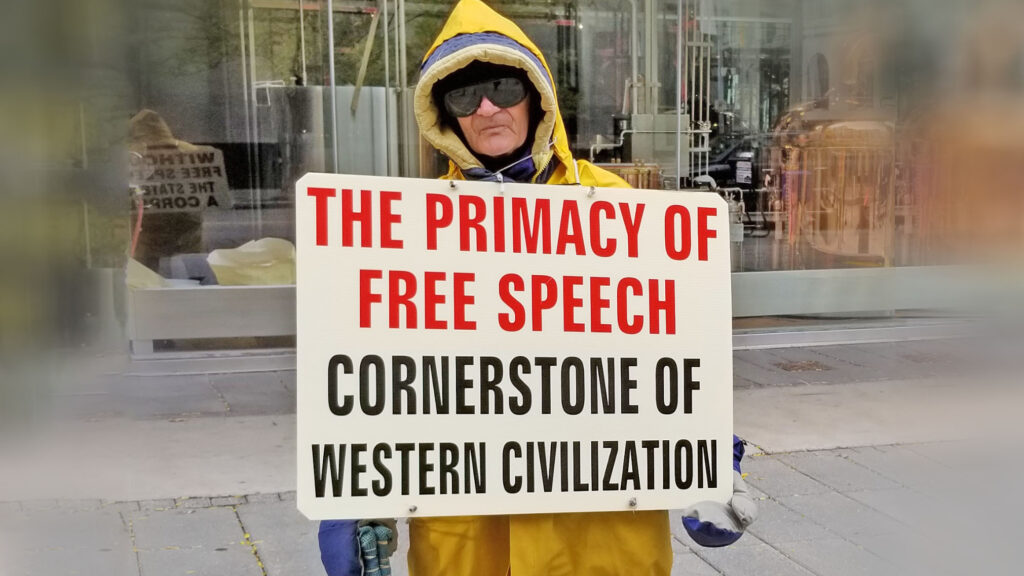Quinton Amundson
Canadian Catholic News
Pro-lifers are sounding the alarm about the new, national “bubble-zone” laws that become active Jan. 16, 30 days since Bill C-3 attained royal assent.
The new law criminalizes individuals who engage “in any conduct with the intent to provoke a state of fear” within a 50-metre exclusion zone outside health facilities.
Specifically, these new laws punish individuals who intimidate medical professionals, assistants or people seeking health services or intentionally “obstructs or interferes” with someone’s access to a health-care facility.
Breaking these new orders could lead to jail time up to 10 years.
Mary Wagner has endured many prison stays dating back to 1999 for breaching “bubble-zone” laws in Toronto and Vancouver to counsel women not to terminate their unborn child.
“The passing of Bill C-3 is very deeply distressing,” said Wagner. “Our youngest brothers and sisters have absolutely no protection in law, and now the heavy hand of corrupt law would muffle even more their faint cry, threatening to punish severely those who seek to love, protect and advocate for these little ones.”
Phil Horgan, a former president of the Catholic Civil Rights League, told Canadian Catholic News that “wording of the legislation remains open to interpretation,” and that invites controversy.
“It will be a challenge for police and for civic officials to determine, beyond a reasonable doubt, what constitutes a ‘state of fear’ in some observer, or what actions may be understood to ‘intentionally obstruct or interfere’ access to a health facility, or how the defence of ‘communicating information’ may be defined or applied, given the language which has been adopted,” said Horgan.
The legislation, Horgan believes, “could be a reaction to vaccine protests” that have seen anti-vaccination protests targeting hospitals and schools across Canada, but added it may quash “any sort of peaceful protest, such as silent prayer by 40 Days for Life campaigns, or peaceful efforts at counselling or facilitating information.”
Horgan represents Father Tony Van Hee, an 86-year-old Jesuit priest who has held a silent vigil against abortion for 30 years on Parliament Hill.
In October 2018, Van Hee was charged for violating Ontario’s controversial 2017 Safe Access to Abortion Services Act near the Morgentaler abortion facility in Ottawa. He is charged under two sections: trying to inform people about abortion services and expressing disapproval within the 50-metre exclusion zone created around abortion facilities. This despite carrying a sign that made no reference to abortion. Rather, the sign he carried condemned the erosion of free speech.
Horgan argues the charges violate the Canadian Charter of Rights and Freedoms. Court filings indicate he “never mentioned or referred to abortion services or related issues,” and “did not provide information related to abortion or perform or attempt to perform an act of disapproval concerning abortion.”
Van Hee’s team also seeks a declaration that the act oversteps the mark as criminal matters are federal jurisdiction. Horgan wrote that Bill C-3 points to this issue.
“This newly enacted amendment to the Criminal Code seems to address that existing provincial laws, which carry similar penalties, have in fact crossed into the federal sphere, which makes such provincial legislation highly suspect,” he said.
While Horgan evaluates how Bill C-3 works into the Van Hee case, Wagner said she will seek to move the pro-life fight forward despite new legislation in the path.
“The passing of this bill should spur us on to increase our faith, hope and love,” she said. “We cannot permit bad laws to determine our actions and goals; as people blessed with the gift of faith, we have to keep our eyes on the one true prize, who can always be found looking to be loved and to love in the poor our world rejects.”

